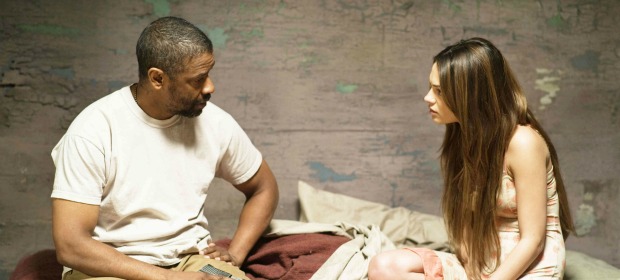The Book of Eli
Mysterious traveller Eli walks the desolate highways of the USA "heading west" on a mission which even he isn't entirely clear on.
Plot summary
A post-apocalyptic tale, in which a lone man fights his way across America in order to protect a sacred book that holds the secrets to saving humankind.

Set in a post-apocalyptic world, 2043 to be exact, mysterious traveller Eli (Denzel Washington) walks the desolate highways of the USA “heading west” on a mission which even he isn’t entirely clear on. He carries a book that tyrannical gangster Carnegie (Gary Oldman) is desperate to get his hands on in order to settle the moral chaos in his imperfect township, or rather control the rowdy masses to his advantage. Eli is joined on his journey by Solara (Mila Kunis) who longs for a better life outside of the hellish town where Carnegie prostitutes her to the horror of her helpless mother (Jennifer Beals).
The new world is presented as bleak and starkly devoid of life, where roadside gangs pillage and rape in a typical “the world as we know it is over” fashion. Most of the surviving humans are afflicted with varying levels of blindness, or at least extreme sensitivity to light, either due to the war or the “hole in the sky” that followed. Water is scarce and highly sought after, although strangely petrol and ammunition, and sunglasses for that matter, seem readily available. A great emphasis is placed on the value of items that the audience would consider disposable; lighters, scarves, and KFC hand wipes are all valuable for trading – one of the best scenes in the film comes in a haggling exchange between Washington and a shop owner played excellently by Tom Waits.
It wouldn’t be spoiling anything to say that the titular book is shown early on to be a Bible, and Eli (who’s name translates literally as “deity”) is intended as some kind of Christian prophet, guided by a singular conviction to protect his book and take it to a place where it will be safe. Eli explains to Solara that he is led by a voice in his head, promising to protect him from harm. Indeed, he’s luckier than Pulp Fiction’s Jules and Vince when it comes to dodging bullets, and faced with a gang of armed thugs – one wielding a chainsaw – he is able to take them out single-handed with a machete.
The film is confusingly both pro and anti-religion and has a tangled moral message, repeatedly smacking the audience about their collective head with religious allegory and the importance of devoting yourself to “the cause”. However, Carnegie refers to the control that possessing the book would allow him, explaining to his lackeys that it was done in the “world before” – surely an attack on institutionalised religion – and references are made by various characters to the mass burnings of Bibles at some unspecified point in the past, presumably seen as the cause of world chaos. Eli is presented as saintly but often makes reference to “bad things” he has had to do in the course of protecting the book, and early on is seen avoiding a confrontation between a travelling couple and a murderous gang muttering, “it’s not your concern, it’s not your concern”.
The Book of Eli follows very much in the vein of previous bleak post-something hero films (in fact one notable shoot-out scene is incredibly familiar as a nod to the famous single-shot action sequence in Children of Men) but is more concerned with Western-style showdowns than more subtle character development. Washington is as watchable as ever, and the supporting cast, especially Oldman, do a fine job of bulking out their limited characters.
The film offers a few great moments that lie somewhere between darkly comic and uncanny, but the dialogue is too clunky and often-intimate scenes between characters are marred with explanatory conversation. The obligatory twist is so transparent that it may as well be written into the opening credits, it is as if the filmmakers are constantly nudging you throughout the plot (“Have you got it yet? How about now?”) like an annoying toddler repeatedly kicking the back of your seat. If you are looking to be vaguely entertained for 90 minutes then this is your film, if you prefer a little food for thought with your dystopian cinema, then go and see The Road.











COMMENTS